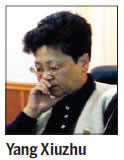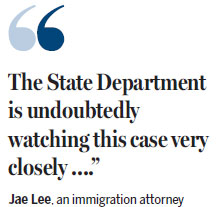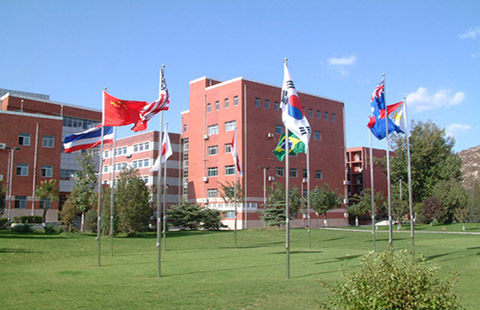Diplomacy could hold key to fugitive case
Updated: 2015-06-12 11:48
By Paul Welitzkin in New York(China Daily USA)
|
||||||||
As China's most-wanted economic fugitives sits in a New Jersey jail seeking asylum in the United States, legal observers say the US and China may resolve her status through diplomacy.
The first hearing for Yang Xiuzhu took place on Tuesday at an immigration court in Manhattan. The 30-minute hearing was held behind closed doors in response to Yang's privacy waiver request.
She is one of the 100 Chinese nationals suspected of corruption who are believed to have fled abroad. Yang used to serve as vice-mayor of Wenzhou, a coastal city in the eastern Zhejiang province. Chinese investigators say they have evidence that Yang accepted 253 million yuan ($40.7 million) in bribes.
US Immigration and Customs Enforcement (ICE) confirmed that Yang is being held at the Hudson County Correctional Center in Kearny, about 10 miles from Manhattan, for "violating the terms of the Visa Waiver Program," and asked the immigration court to deport her to China.
Yang was detained last June as she was entering the US from Canada using a fake Dutch passport.

"I think the State Department will be inclined to work with China on an extradition" for Yang, Lenni Benson, professor of law at New York Law School and director of the Safe Passage Project said in an interview with China Daily on Thursday.
She added there is a section of immigration law that contains an exception to asylum protection "(if) there are serious reasons for believing that the alien has committed a serious non-political crime outside the United States prior to the arrival of the alien in the United States," the section reads.
Jae Lee, an immigration attorney in New York, said Yang's corruption charges will affect her case.
"The State Department is undoubtedly watching this case very closely and there may be some high-level diplomacy happening between China and the US behind the scenes," he said.
"Yang may argue that the corruption charges are merely a pretext by the Chinese government, and that its true motivation for prosecution is based on her political opinion. Since asylum proceedings are closed to the public, we don't know what arguments she has raised.
"She can only win if she proves her claim, because she bears the burden of proof. It will be difficult based on what we know about her case publicly," he said.
Meanwhile, on Thursday a Chinese Foreign Ministry spokesman urged the US to repatriate Yang at the earliest date.
Last year Chinese officials said more than 150 "economic fugitives", many of them described as corrupt government officials, were in the US.
Even though the US and China lack a formal extradition treaty, officials from the two countries hope to strengthen cooperation on repatriating Chinese fugitives and stolen assets.
Stephen W. Yale-Loehr, a professor at the Cornell University law school in Ithaca, New York, wrote in an e-mail that "any asylum applicant must prove that they have at least a 10 percent chance of being persecuted in their home country because of their race, religion, nationality, political opinion, or membership in a particular social group. Simply being jailed for a crime isn't persecution, but having your life threatened would be persecution."

Immigration attorney Lee said persecution can come in many forms, including imprisonment, physical violence and even discrimination.
"In the case of Yang, one can speculate that the only applicable ground for her asylum claim is on the basis of her political opinion," he said in an e-mail.
"It is not enough that she would face harsh sanctions for her embezzlement charges, because a country's prosecution and punishment of individuals for violations of legitimate penal laws is not considered persecution, but rather the prerogative of a sovereign nation," Lee said.
"Even if a person can prove they might be persecuted, they can be denied asylum if they persecuted others, were convicted of a particularly serious crime, or are a danger to US security," Cornell's Yale-Loehr added.
New York Law School's Benson noted that Yang's immigration status will fall under three legal categories: extradition, extraordinary rendition and deportation.
"My view is that a person should be able to make an asylum claim in any of those cases," she said.
paulwelitzkin@chinadailyusa.com
 Warriors top Cavaliers to square up NBA Finals
Warriors top Cavaliers to square up NBA Finals
 Top 10 most expensive private schools in Beijing
Top 10 most expensive private schools in Beijing
 Want new ear or car? Try 3-D printing
Want new ear or car? Try 3-D printing
 Ten photos you don't wanna miss - June 12
Ten photos you don't wanna miss - June 12
 Beijing enjoys clear skies
Beijing enjoys clear skies
 Top 10 investor countries and regions
Top 10 investor countries and regions
 Beijing showcases Olympic exhibits and visions
Beijing showcases Olympic exhibits and visions
 Ten photos you don't wanna miss - June 11
Ten photos you don't wanna miss - June 11
Most Viewed
Editor's Picks

|

|

|

|

|

|
Today's Top News
Former security chief sentenced to life in prison
Top brass visit Pentagon
China committed to addressing climate change
Murdoch's sons to become CEO, co-chair at 21st Century Fox
Carter greets General Fan at Pentagon
Pentagon to greet General from China
Helping the Hill understand China
Suu Kyi begins groundbreaking visit
US Weekly

|

|







